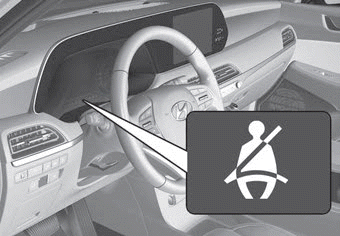Hyundai Palisade: Driving Your Vehicle / Blind-Spot Collision Warning/ Blind-Spot Collision-Avoidance Assist
System Description
Blind-Spot Collision Warning (BCW)
The Blind-Spot Collision Warning (BCW) system uses radar sensors in the rear bumper to monitor and warn the driver when it detects an approaching vehicle in the driver's blind spot area.
1) Blind-Spot Area

The blind spot detection range varies relative to vehicle speed.
Note that if your vehicle is traveling much faster than the vehicles around you, the warning will not occur.
2) Closing at high speed

The Lane Change Assist feature will alert you when it detects a vehicle is approaching in an adjacent lane at a high rate of speed. If the driver activates the turn signal when the system detects an oncoming vehicle, the system sounds an audible alert.
Blind-Spot Collision-Avoidance Assist (BCA)

The Blind-Spot Collision-Avoidance Assist (BCA) system helps detect the front lane through the camera installed on the upper front windshield and helps detect the side/rear areas through radar sensors.
The Blind-Spot Collision-Avoidance Assist system may activate the Electronic Stability Control (ESC) if there is a possible collision with an approaching vehicle while changing lanes. It is to help mitigate the collision risk or collision damage.
WARNING
- Always be aware of road conditions while driving and be alert for unexpected situations even though the Blind- Spot Collision Warning system and Blind-Spot Collision- Avoidance Assist system are operating.
- The Blind-Spot Collision Warning (BCW) system and Blind-Spot Collision- Avoidance Assist (BCA) system are supplemental systems to assist you. Do not entirely rely on the systems. Always pay attention, while driving, for your safety.
- The Blind-Spot Collision Warning (BCW) system and Blind-Spot Collision- Avoidance Assist (BCA) system are not substitutes for proper and safe driving. Always drive safely and use caution when changing lanes or backing up the vehicle. The Blind-Spot Collision Warning (BCW) system and Blind-Spot Collision- Avoidance Assist (BCA) system may not detect every object alongside the vehicle.
- System Setting and Operation
- Warning and System Control
- Detecting Sensor (Camera and Radar)
- Limitations of the System
 Detecting pedestrians
Detecting pedestrians
The sensor may be limited when:
The pedestrian is not fully detected
by the camera recognition system,
for example, if the pedestrian is
leaning over or is not fully walking
upright
The pedestrian is moving very
quickly or appears abruptly in the
camera detection area
The pedestrian is wearing clothing
that easily blends into the background,
making it difficult to be
detected by the camera recognition
system
The outside lighting is too bright
(e...
 System Setting and Operation
System Setting and Operation
System setting
• Setting Blind-Spot Safety function
The driver can activate the system
by placing the ignition switch to the
ON position and by selecting 'User
Settings → Driver Assistance →
Blind-Spot Safety'
- BCA and BCW turn on and are
ready to be operated when
'Active Assist' is selected...
Other information:
Hyundai Palisade (LX2) 2020-2025 Service Manual: Water Temperature Control Assembly
Repair procedures Removal and Installation • Be careful not to damage the parts located under the vehicle (floor under cover, fuel filter, fuel tank and canister) when raising the vehicle using the lift...
Hyundai Palisade (LX2) 2020-2025 Owner's Manual: Remote start
You can start the vehicle using the remote start button (4) of the smart key. To start the vehicle remotely : - Lock the doors by pressing the door lock button (1) within 32 ft (10 m) distance from the vehicle. - Press the remote start button for over 2 seconds within 4 seconds after locking the doors...
Categories
- Manuals Home
- 1st Generation Palisade Owners Manual
- 1st Generation Palisade Service Manual
- Auto Hold
- Electrochromatic Mirror (ECM) with homelink system
- Theft-alarm system
- New on site
- Most important about car
Seat Belt Warning Light
Seat belt warning light

Driver's seat belt warning
As a reminder to the driver, the seat belt warning light will illuminate for approximately 6 seconds each time you place the ignition switch to the ON position regardless of belt fastening. At this time, if the seat belt is not fastened a warning chime will sound for 6 seconds.
